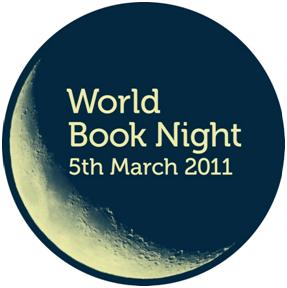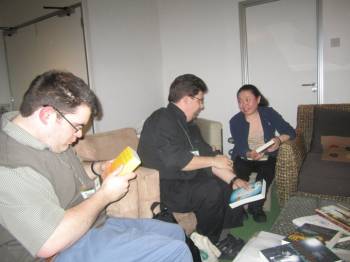 Last week in Strange Horizons, I was disappointed with Rosa Montero’s Tears in Rain. But I actually read that book a month or so ago; more recently, I’ve come across two more pieces of fiction that have caused me to continue the train of thought I started in my SH review. The first is vN by Madeline Ashby, which I read because I saw it being discussed as one of the likely novels that missed out on the BSFA Award shortlist.
Last week in Strange Horizons, I was disappointed with Rosa Montero’s Tears in Rain. But I actually read that book a month or so ago; more recently, I’ve come across two more pieces of fiction that have caused me to continue the train of thought I started in my SH review. The first is vN by Madeline Ashby, which I read because I saw it being discussed as one of the likely novels that missed out on the BSFA Award shortlist.
For the first few pages of vN, my impression was favourable. We’re introduced to Jack Peterson, whose wife Charlotte and daughter Amy are both self-replicating androids (von Neumann machines, or vN). Right from the start, ethical complexity is at the front and centre: all vN from the same clade (‘family’) look identical, and this will also be trur for Amy and Charlotte; so, Jack wonders, “what if one day, years from now, he kissed the wrong one as he walked through the door?” (p. 8). There’s no chance of that yet, though, because Jack is deliberately refraining from feeding Amy a full diet of vN food, so that she can grow up at the same rate as a human child. But, as Amy’s principal points out, this may not be such an appropriate thing to do: “She is not a kindergartener, and has not been one for years” (p. 22). The stage is set for a thought-provoking read.
By the end of the prologue, I was feeling less enthusiastic. At Amy’s kindergarten graduation, her grandmother Portia appears and tries to kill her. A boy dies in the ensuing scuffle, and a ravenously hungry Amy eats her own grandmother, which causes her body to grow into that of an adult. In the context of another book, I’d probably like this offbeat spirit; but here it set alarm bells ringing that cartoonish violence might win out over the more thoughtful material – and so it proves.
Amy spends most of the novel on the run, pursued by members of her own clade and others besides. She’s of interest to them because her failsafe (which stops vN from harming humans, but also induces nausea in them if they witness human injury and suffering) no longer works. This chase plot allows Ashby to show more of her future society. There’s further exploration of the place of vN, and how their presence has changed things. it is certainly much more searching and satisfying than the examination of ideas in Tears in Rain – but, for all that, it’s clearly playing second fiddle to the action.
And, despite some striking images (such as Amy being set upon by crowds of vN who look just like her), much of the novel is quite uninvolving, Partly this is down to the prose, which never seems to catch fire again as it did in the first pages. But mostly I think it’s because the sense of place is so very sketchy. The backdrop of Tears in Rain may be generic, but at least it has an atmosphere, however ready-made; too often, the events of vN may as well be taking place in front of a blank wall (a sequence set in a museum of the city of Seattle really shows up the limitations of the rest). As a result, Ashby’s book is lacking in the detail and context that would help to give the action dramatic weight. By the time the final plot revelations came, I just didn’t care any more.
***
My other recent robot story is ‘Be Right Back’, the first film in the new series of Charlie Brooker’s Black Mirror. We meet a young couple, Martha (played by Hayley Atwell) and Ash (Domnhall Gleeson). He heads out to return a courtesy car to the garage; she, an illustrator, stays at home to work on an urgent new commission. But Martha experiences a growing sense of dread that the worst has happened to Ash – and her fears are swiftly confirmed. At the funeral, Martha’s friend Sarah offers to introduce her to “something that will help”. At first, she doesn’t want to hear it; but soon finds herself signed up for – and swiftly drawn into – a service that uses a dead person’s online traces to reconstruct a virtual version of their personality. Martha moves from messaging ‘Ash’, to speaking to his construct on the phone – before paying for it (him?) to be downloaded into an artificial body.
As a fully rounded piece of drama, ‘Be Right Back’ has its shortcomings, particularly that the opening section establishing the couple’s relationship is that bit too compressed for one to become fully invested in it emotionally. But ‘Be Right Back’ is weighted towards its ideas, and there it works better. I actually found it the most satisfying of these three robot stories, because it’s best able to achieve what it sets out to do, and reaches furthest into its issues. ‘Be Right Back’ is content just to focus on the relationship between two individuals, which is quite a refreshing change in a contemporary work of science fiction. We see Martha’s changing reaction to Ash, shifting from the delight of being able to hear his voice again to the despair of the uncanny valley as she realises that this is not him – that the robot looks and sounds like Ash, but doesn’t sleep, breathe, or react like him. The surface is there, but not the spark.
In the great scheme of things, ‘Be Right Back’ may not go as deep as it could (it’s not as searching or elegant as Chris Beckett’s ‘The Turing Test’, for example). But where it does go is still worthwhile: in one of the film’s later scenes, Martha – now at her wit’s end – has taken the Ash-robot to the cliffs, and instructs it to jump. At first, ‘Ash’ is calmly accepting of this, until Martha remarks that he would be afraid – at which point the robot slips seamlessly into the role of crying, pleading Ash. It’s a stronger moment than anything in vN or Tears in Rain – and just the sort of touch that a story like this needs.


Recent Comments